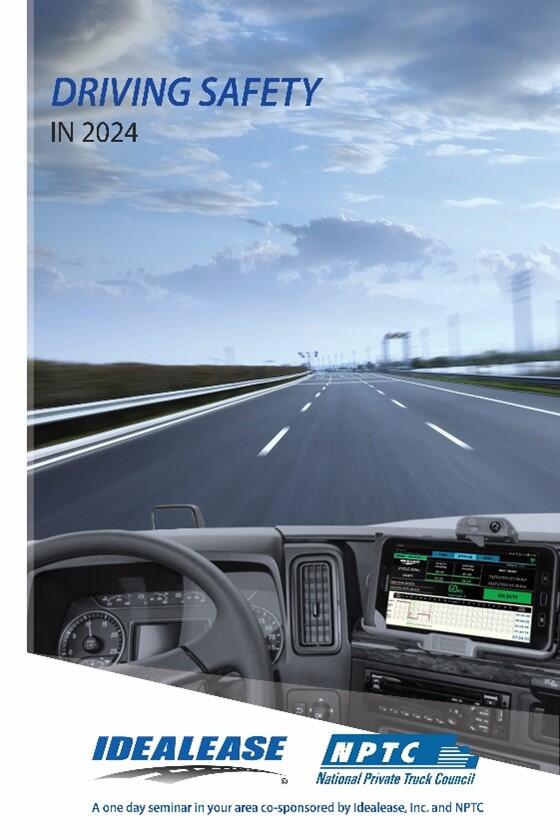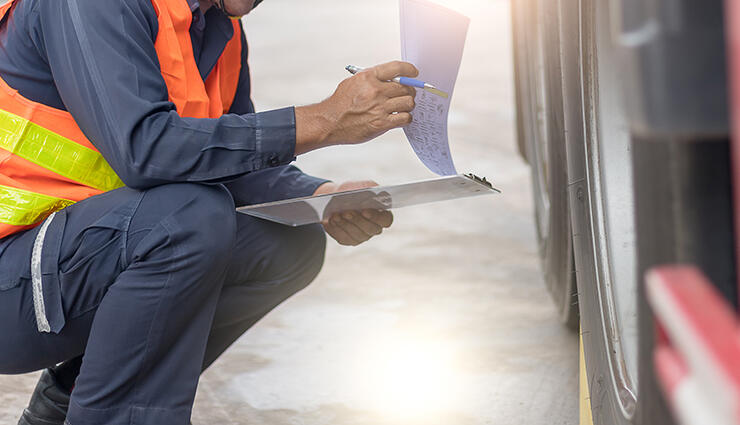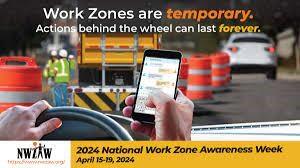Are Your Drivers Obligated to Stop at Weigh Stations?
Check out the latest Idealease Safety Bulletin for the most up-to-date information on weigh stations and their guidelines. Don't forget to subscribe to receive all future bulletins!
In this issue:
- What trucks are required to enter a weigh station?
- Tips when entering a Weigh Station
- National Work Zone Awareness Week April 15-19th
- CVSA’s International Roadcheck Is Scheduled for May 14-16
- Registration Now Open for the 2024 Idealease/NPTC Safety Seminars!
As a professional truck driver, you will encounter weigh stations. These stops are monitored by the Department of Transportation, Department of Motor Vehicles, or other transportation officers to ensure that truck weight is not causing damage to America's roadways or other infrastructure, such as bridges. While you may see this as an inconvenience, weigh stations are crucial for ensuring the safety of everyone on the road, including truck drivers.
Understanding the weigh station rules and procedures can help you be prepared for what is coming and prevent a minor inconvenience from turning into a major one. Commercial vehicles are required to stop at weigh stations (truck scales) found along the highway or interstate. This is to ensure that regulations are followed, as under most circumstances, trucks cannot weigh more than 80,000 lbs when fully loaded. Some loads can be exempt, but only for that specific trip, usually for items that can’t be separated into different loads.
Weigh stations exist for safety reasons because heavy trucks are harder to control and more dangerous for the roads and other drivers. They inspect and weigh the truck to ensure that all cargo is transported safely and in accordance with regulations.
What trucks are required to enter a weigh station? The requirements for who must stop at a weigh station vary by state. Generally, if the truck is over 10,000 lbs MGVWR, you must enter the scale. However, some states require trucks less than 10,000 lbs MGVWR to enter the scale.
Below are the state requirements:
- Alabama: An officer may require weighing a truck or trailer by portable or stationary scales and can order a truck to scale if within a 5-mile distance.
- Alaska: Trucks exceeding 10,000 lbs. must stop.
- Arizona: GVW fees apply for trailers and semitrailers of 10,000 lbs or more; commercial trailers or semitrailers; motor vehicles or vehicle combinations if used or transporting passengers for compensation (excluding school buses or charitable organizations); vehicles transporting hazardous materials; or a hearse, ambulance, or similar vehicle used by a mortician. Additionally, any commodity shipped into the state can be inspected for agricultural pests.
- Arkansas: Agricultural vehicles, passenger or specialty vehicles of 10,000 lbs or more, and commercial trucks exceeding 10,000 lbs must stop at weight and inspection stations.
- California: All commercial vehicles must stop for inspection of the size, weight, equipment, and smoke emissions wherever California Highway Patrol is conducting tests and displaying signs.
- Colorado: Every owner or driver of a vehicle with a GVW rating or gross combination weight rating over 26,000 lbs. needs clearance from an office of the DOR, Colorado State Patrol officer, or port of entry weigh station before using it within the state.
- Connecticut: All commercial vehicles, regardless of weight, are required to stop.
- Delaware: The Department of Public Safety secretary may adopt weight regulations and procedures as needed for law enforcement weighing purposes.
- Florida: Agricultural, motor vehicles, including trailers that are or could be used in the production, manufacture, storage, sale, or transportation of any food product or agricultural, horticultural or livestock product, excepting private passenger automobiles without a trailer, travel trailers, camping trailers, and motor homes must stop; so must commercial vehicles with a GWR over 10,000 lbs, made to transport over 10 passengers, or transporting hazardous materials.
- Georgia: Agricultural vehicles, passenger or specialty vehicles of 10,000 lbs or more, and commercial trucks exceeding 10,000 lbs must stop at weight and inspection stations.
- Hawaii: Trucks exceeding 10,000 lbs GVW must stop.
- Idaho: 10 fixed entry points with 10 roving units are available for weighing.
- Illinois: Police officers can pull over vehicles suspected of surpassing weight limits.
- Indiana: Trucks with a GVW of 10,000 lbs or higher must stop.
- Iowa: Any peace officer with reason to believe the weight of a vehicle and its load is unlawful can stop the driver and submit the vehicle to weighing at a portable or stationary scale or require the vehicle to be driven to the nearest public scales. If the vehicle is overweight, the officer may stop the vehicle until enough of the load is removed to bring the GVW down to an acceptable limit. All vehicles over 10,000 lbs must stop.
- Kansas: All registered trucks must stop at motor carrier safety and weight inspection stations when directed by signs. Police officers with reasonable belief that a vehicle is exceeding the weight capacity may require the driver to stop for weighing on portable or stationary scales.
- Kentucky: Agriculture-carrying vehicles and commercial vehicles 10,000 lbs or more must stop.
- Louisiana: Agricultural vehicles, and passenger or specialty vehicles (single or carrying a trailer) and commercial vehicles of 10,000 lbs or more must stop.
- Maine: When directed by a police officer or at a designated weigh station, the driver must let the vehicle be waved and allow examination of registration and the carrying load.
- Maryland: State police maintain 7 weighing and measuring stations with one station on Interstate 95 where agricultural and commercial vehicles over 10,000 lbs must stop, as well as commercial buses carrying over 16 passengers and any hazardous material haulers with placards.
- Massachusets: Agricultural vehicles, and passenger or specialty vehicles (single or carrying a trailer) and commercial vehicles of 10,000 lbs or more must stop.
- Michigan: Vehicles with dual rear wheels moving agricultural products, trucks over 10,000 lbs with dual rear wheels and/or towing construction equipment, and all tractor and semi-trailer combination vehicles must stop.
- Minnesota: Every vehicle with a GVW rating of 10,000 or more must stop.
- Mississippi: Any vehicle can be weighed to verify the accuracy of registration by the State Tax Commission, tax collectors, highway patrol, or another authorized enforcement officer.
- Missouri: All commercial trucks with a GVW rating over 18,000 lbs must stop.
- Montana: Vehicles moving agricultural products and trucks with a GVW rating of 8,000 lbs or greater and new or used RBs being taken to a distributor or dealer must stop.
- Nebraska: Excepting pickup trucks pulling a recreational trailer, all trucks over 1 ton must stop.
- Nevada: Agricultural vehicles, and passenger or specialty vehicles (single or carrying a trailer) and commercial vehicles of 10,000 lbs or more must stop.
- New Hampshire: The driver of every motor vehicle shall stop and submit to a weighing at portable, stationary, or scales within 10 miles of a stopping point upon the request of any law enforcement officer.
- New Jersey: All vehicles 10,001 lbs or more must stop for weighing.
- New Mexico: Trucks weighing 26,001 lbs or more must stop.
- New York: Fixed inspection and weighing stations along with random enforcement through the use of portable units must be followed when directed.
- North Carolina: The Department of Transportation operates 6 to 13 permanent weighing stations that a law enforcement officer may stop a vehicle at to see if its weight complies with its declared gross weight and weight limits.
- North Dakota: Excepting recreational vehicles (RVs) used for personal or recreational purposes, all vehicles with a GVW rating of over 10,000 lbs must stop.
- Ohio: All commercial vehicles exceeding 10,000 lbs (5 tons) must cross scales if they come across open weigh stations.
- Oklahoma: Any officer of the Department of Public Safety, Oklahoma Tax Commission, or any sheriff can stop any vehicle to weigh it with portable or stationary scales.
- Oregon: All vehicles or combination of vehicles over 26,000 lbs must stop.
- Pennsylvania: Agricultural vehicles when using public highways, passenger and specialty vehicles towing large trailers, large RVs, and trucks are subject to inspections and weighing regardless of size.
- Rhode Island: Trucks with a GVW rating over 10,000 lbs and agricultural vehicles must stop.
- South Carolina: If there’s a reason to believe the weight of a vehicle and load is unlawful, the law may require the vehicle to stop and submit to weighing at a portable or stationary scale, or drive to the closest public scales. If an officer determines the weight is unlawful, the vehicle may be stopped and unloaded until it the axle weight or gross weight reaches a safe number. The vehicle operator must take care of the unloaded material at his or her own risk. The scaled total weight of the vehicle cannot be closer than 10% to the true gross weight.
- South Dakota: Agricultural vehicles, trucks, and drive-away operation over 8,000 lbs GVW rating must stop.
- Tennessee: Weigh stations are placed across the state for checking federal and state restrictions related to size, weight, safety and driver regulations.
- Texas: All commercial vehicles must stop when directed by a sign or police officer.
- Utah: Any peace officer with reason to believe the height, weight, or length of a vehicle and its load is unlawful may have the operator stop the vehicle and submit to an inspection, as well as driven to the nearest scales or port-of-entry within 3 miles.
- Vermont: Any uniformed officer with reason to believe the weight of a vehicle and its load is unlawful may have the operator stop the vehicle for up to an hour for determining the weight. If the vehicle driver does not want to submit to weighing at portable scales, they may have their vehicle weighed at the nearest public scales, unless those are not reasonably nearby.
- Virginia: Trucks with a registered gross weight exceeding 7,500 lbs must stop.
- Washington: Agricultural vehicles and trucks exceeding 10,000 lbs must stop.
- West Virginia: A police officer or motor carrier safety enforcement officer may require the driver of a vehicle or combination of vehicles to stop for weighing at a portable or stationary weighing station or drive to the nearest weighing station if within 2 miles of where the vehicle is stopped.
- Wisconsin: Trucks over 10,000 lbs in GVW must stop.
- Wyoming: Trucks are required to stop when instructed by a regulatory sign or police officer, and can be chosen for inspection randomly. All oversize and overweight loads of 150,000 lbs or more must have a permit, or permission to enter the state in order to buy a permit, before entering Wyoming and driving on state roads.
If you drive a large vehicle and think you might need to stop at a weigh station, check the laws in the state(s) you will be driving through. Most trucks have their maximum load weight posted on the side. If you are ever unsure, stop at a weigh station to avoid a big fine and to understand what your vehicle can handle.
Tips when entering a Weigh Station
Weigh stations are essential for the Department of Transportation (DOT) to ensure you’re traveling with a safe load.
The Approach
When you're driving on a highway, you might come across signs for weigh stations. These stations check the weight of trucks to ensure they are safe for the road. If you see a sign saying the weigh station is open, get into the right lane and follow the signs. Some stations have a service called PrePass that can speed up the process for equipped trucks.
In some states, there are scales on the road before the weigh station that can weigh trucks as they drive. If you see signs for these scales, stay in the right lane and follow the electronic signs.
It's important to stay focused when approaching weigh stations and not use your cell phone, even with a hands-free device. Follow the speed limits and, if you miss the entrance to the station, don't try to back up. It's unsafe and could result in a violation. Just keep driving and hope you won't be pursued by enforcement.
The Scale
Remember to adhere to the speed limit as you drive onto the scale. If you pass over the scale at the correct speed and with a proper load, you’ll be sent on your way in the bypass lane. The scale will give directions for slowing down and stopping. You may be asked to move right over the scale or to stop so they can weigh each axle. If you are confused when entering the scale, pull over and park in a designated area. Then, come into the station building and ask for assistance.
The Inspection
After your truck has been weighed at the weigh station, they will enter your DOT number into a computer system to make sure your driving log is accurate in case they decide to inspect you later. They will also check your safety rating (don't worry if it's your first trip), your equipment, and your hours of service, as well as your electronic logging device (ELD). If everything is okay, you'll be on your way shortly. But if there are any issues, be prepared for a delay. If your equipment is faulty or missing, they will conduct a more detailed inspection. And if there's a problem with your ELD, you could be taken off the road for hours until it's fixed. This is why it's important to always make sure your ELD and equipment are in good shape!
A thorough pre-trip inspection is crucial for a successful visit to a weigh station!
That's all there is to it! It's not so scary if you have everything in order, drive safely, and cooperate with the weigh station employees. You'll be on your way through in no time.

Registration Now Open for the 2024 Idealease/NPTC Safety Seminars!
Driving Safety in 2024
Idealease and the National Private Truck Council (NPTC) are excited to announce the opening of registration for the 2024 Safety Seminars. These one-day seminars will focus on crucial topics such as safety data analysis, basic safety and compliance, regulation changes, and CSA.
Who Can Attend: These seminars are open to all Idealease customers, potential customers, and NPTC members, and are provided at no charge.
Seminar Highlights:
- Gain insights into safety practices and compliance regulations.
- Learn about the latest advancements in safety technology.
- Understand CSA (Compliance, Safety, Accountability) and its impact on your operations.
Why Attend: Whether you're a novice or experienced transportation professional, these seminars offer valuable information to enhance your safety practices.
Registration Details: Seminars are currently available for registration, with venues secured for the following locations:
Spring 2024
- 4/10/24: Sun Prairie, WI
- 4/18/24: Frankfort, KY
- 5/9/24: Tampa, FL
- 5/21/24: Portland, OR
- 5/23/24: Santa Rosa, CA
Fall 2024
- 10/1/24: Eugene, OR
- 10/3/24: San Leandro, CA
- 10/9/24: Baltimore, MD
Note: If you don't see a seminar in your area listed yet, don't worry. Registration availability will be updated weekly as venues are secured. Keep an eye on this bulletin for the latest updates.
To register for an upcoming seminar in 2024, click on the following link: Safety Seminar Registration. Don't miss out on this opportunity to enhance your safety knowledge and practices in 2024. Register today!

The Commercial Vehicle Safety Alliance’s (CVSA) International Roadcheck is scheduled for May 14-16. International Roadcheck is a three-day, high-visibility initiative across Canada, Mexico, and the United States, focusing on commercial motor vehicle inspection and regulatory compliance enforcement.
CVSA-certified law enforcement personnel will inspect commercial motor vehicles and drivers at weigh/inspection stations, temporary sites, and mobile patrols to ensure compliance with federal, state, provincial, or territorial regulations. Data collected during the 72-hour period will be analyzed and results released this summer.
This year, International Roadcheck will spotlight two areas: tractor protection systems and alcohol and controlled substance possession. Controlled substance and alcohol use remains a significant concern, with an increasing number of prohibited drivers listed in the U.S. Drug and Alcohol Clearinghouse (DACH), posing a threat to road safety.
Focusing on tractor protection systems aims to raise awareness among drivers, motor carriers, technicians, and enforcement personnel regarding critical vehicle components such as the tractor protection valve, trailer supply valve, and anti-bleed back valve. These components, often overlooked during inspections, are crucial for safety. To aid in proactive assessment and maintenance, CVSA has provided an inspection bulletin outlining the steps for proper checks, available in French and Spanish.
During International Roadcheck, inspectors will conduct routine North American Standard Level I Inspections, a comprehensive 37-step procedure examining vehicle components and driver documentation.
For more information on Roadcheck 2024, visit: [https://www.cvsa.org/news/2024-international-roadcheck/]

National Work Zone Awareness Week: April 15-19th
During April 15-19th, we observe National Work Zone Awareness Week, a critical time for our drivers as they encounter work zones. Each year, around 600 individuals tragically lose their lives in roadway work zones, with approximately 90 workers succumbing to fatal accidents, often involving vehicles intruding into marked construction areas. Prioritizing the elimination of distractions while approaching and navigating through work zones is essential.
National Work Zone Awareness Week (NWZAW) is a springtime campaign dedicated to promoting safe driving practices in highway work zones and construction sites. NWZAW emphasizes the importance of exercising heightened caution in these areas, serving as an annual reminder for drivers to remain vigilant. For further information, please visit the following resources:
*The Idealease Safety Bulletin is provided for Idealease locations and their customers and is not to be construed as a complete or exhaustive source of compliance or safety information. The Idealease Safety Bulletin is advisory in nature and does not warrant, guarantee, or otherwise certify compliance with laws, regulations, requirements, or guidelines of any local, state, or Federal agency and/or governing body, or industry standards.
